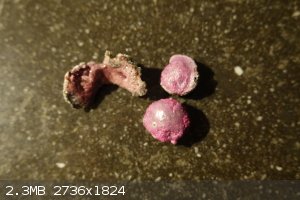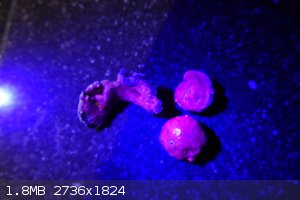metalresearcher
National Hazard
   
Posts: 758
Registered: 7-9-2010
Member Is Offline
Mood: Reactive
|
|
My synthetic rubies are somewhat impure, how to make cleaner ?
Using a DC welder with two carbon rods, some Al2O3 powder and 1/50 of that amount of green Cr2O3 to heat the powder mixture to over 2000 C. That
worked quickly , but the cavity in the cell concrete also melted, so it got contaminated. I tried again using on a piece of wood. I thought, wood
carbonizes and does not mix with Al2O3. But ruby was barely formed, unlike on cell concrete.
On Nighthawking Light videos I saw he got some small rubies on firebrick.
Did anyone experiment with making ruby ?
Video: https://www.metallab.net/jwplayer/video.php?v=L2NsaXBzL1N5bn...
|
|
|
mysteriusbhoice
Hazard to Others
  
Posts: 477
Registered: 27-1-2016
Member Is Offline
Mood: Became chemistry catboy Vtuber Nyaa
|
|
the thing with graphite electrodes is that the plasma itself contains carbon and can cause that to be imbedded in your ruby or mixed in when its
molten and touching it but best way to avoid most contamination is to strike the arc and ensure that the rods dont touch the pile of ruby but only the
plasma should touch it.
if your arc is too small consider using higher voltage around 36 which makes larger sustained arcs.
|
|
|
wg48temp9
National Hazard
   
Posts: 786
Registered: 30-12-2018
Location: not so United Kingdom
Member Is Offline
|
|
No I have not experimented making ruby. I have attempted the Verneuil process with sand using an oxy propane welding torch but the fast moving flame
pushed most of the sand away before it got to the hot part of the flame.
I am surprised that the carbon arc method used by Nighthawk produced ruby that was sufficiently pure, meaning not sufficiently contaminated with fire
brick or carbon to not be fluorescent. Perhaps at 2,000C most of the carbon was oxidized and escaped as CO or CO2.
[Edited on 9/21/2020 by wg48temp9]
I am wg48 but not on my usual pc hence the temp handle.
Thank goodness for Fleming and the fungi.
Old codger' lives matters, wear a mask and help save them.
Be aware of demagoguery, keep your frontal lobes fully engaged.
I don't know who invented mRNA vaccines but they should get a fancy medal and I hope they made a shed load of money from it.
|
|
|
mysteriusbhoice
Hazard to Others
  
Posts: 477
Registered: 27-1-2016
Member Is Offline
Mood: Became chemistry catboy Vtuber Nyaa
|
|
my guess is if you have some sort of flux of KNO3 then your carbon wont be contaminating your ruby since it will vaporize into CO2.
NaClO3 works aswell for this purpose but it maybe a little too reactive.
|
|
|
unionised
International Hazard
    
Posts: 5128
Registered: 1-11-2003
Location: UK
Member Is Offline
Mood: No Mood
|
|
KNO3 will convert the Cr2O3 to chromate so I can't see that helping.
The best thing I can think of to support your Al2O3 / Cr2O3 mix while melting it is more Al2O3.
I'm actually quite surprised to see that you can get ruby that's good enough to see the fluorescence.
Well done.
|
|
|
wg48temp9
National Hazard
   
Posts: 786
Registered: 30-12-2018
Location: not so United Kingdom
Member Is Offline
|
|
Quote: Originally posted by unionised  | KNO3 will convert the Cr2O3 to chromate so I can't see that helping.
The best thing I can think of to support your Al2O3 / Cr2O3 mix while melting it is more Al2O3. |
I would expect KNO3 to form an aluminate.
From memory they use florides as fluxes.
I am wg48 but not on my usual pc hence the temp handle.
Thank goodness for Fleming and the fungi.
Old codger' lives matters, wear a mask and help save them.
Be aware of demagoguery, keep your frontal lobes fully engaged.
I don't know who invented mRNA vaccines but they should get a fancy medal and I hope they made a shed load of money from it.
|
|
|
metalresearcher
National Hazard
   
Posts: 758
Registered: 7-9-2010
Member Is Offline
Mood: Reactive
|
|
I tried again, but now with a larger pile of Al2O3 / Cr2O3 mixture, preventing the arc reaching the floor (on which the pile is) which melts and
contaminates. And I avoided touching the powder and the molten ruby with the carbon rods.
Much better results now.
|
|
|
wg48temp9
National Hazard
   
Posts: 786
Registered: 30-12-2018
Location: not so United Kingdom
Member Is Offline
|
|
Quote: Originally posted by metalresearcher  | I tried again, but now with a larger pile of Al2O3 / Cr2O3 mixture, preventing the arc reaching the floor (on which the pile is) which melts and
contaminates. And I avoided touching the powder and the molten ruby with the carbon rods.
Much better results now. |
Can we see pictures in ordinary light and UV please.
PS: Some carbon gouging rods have a core that contains salts preferably you should use the plain ones.
[Edited on 9/22/2020 by wg48temp9]
I am wg48 but not on my usual pc hence the temp handle.
Thank goodness for Fleming and the fungi.
Old codger' lives matters, wear a mask and help save them.
Be aware of demagoguery, keep your frontal lobes fully engaged.
I don't know who invented mRNA vaccines but they should get a fancy medal and I hope they made a shed load of money from it.
|
|
|
metalresearcher
National Hazard
   
Posts: 758
Registered: 7-9-2010
Member Is Offline
Mood: Reactive
|
|
Here they are, they are about 12mm large.
My carbon rods are pure carbon, no salts inside and no copper cladding.
 
|
|
|
wg48temp9
National Hazard
   
Posts: 786
Registered: 30-12-2018
Location: not so United Kingdom
Member Is Offline
|
|
Thanks mr. Those ruby nuggets are spectacular.
I am wg48 but not on my usual pc hence the temp handle.
Thank goodness for Fleming and the fungi.
Old codger' lives matters, wear a mask and help save them.
Be aware of demagoguery, keep your frontal lobes fully engaged.
I don't know who invented mRNA vaccines but they should get a fancy medal and I hope they made a shed load of money from it.
|
|
|
mysteriusbhoice
Hazard to Others
  
Posts: 477
Registered: 27-1-2016
Member Is Offline
Mood: Became chemistry catboy Vtuber Nyaa
|
|
now make blue saphires idk what does that tho maybe cobalt??
|
|
|
sciece nerd
Harmless

Posts: 25
Registered: 27-8-2019
Member Is Offline
|
|
FeO and TiO2, don't know if the FeO can survive high temperature heating in air though.
|
|
|
OldNubbins
Hazard to Others
  
Posts: 136
Registered: 2-2-2017
Location: CA
Member Is Offline
Mood: Comfortably Numb
|
|
I have done some rubies and found this has helped:
Mix the chrome and aluminum oxides with a small amount of fluoride-containing flux (silver brazing flux) with a small amount of water to make a
clay-like paste. Let that dry completely and it will form a fairly sturdy piece that will not blow apart when you hit it with the arc. I got tired of
the powdery piles blowing all over the place. I also found I was able to achieve some fluorescence by heading the "ceramic" with a maxed out blow
torch (no supplemental oxygen). It doesn't get intensely pink but "pinkish" and it glows slightly under UV.
|
|
|
metalresearcher
National Hazard
   
Posts: 758
Registered: 7-9-2010
Member Is Offline
Mood: Reactive
|
|
The idea of making a kind of pellets is very good to prevent the arc blowing away the powder.
But why fluoride containing flux ? You mean CaF2 ? And using lower melting salts (e.g. NaCl or CaCl2) as a flux ?
|
|
|
wg48temp9
National Hazard
   
Posts: 786
Registered: 30-12-2018
Location: not so United Kingdom
Member Is Offline
|
|
Quote: Originally posted by metalresearcher  | The idea of making a kind of pellets is very good to prevent the arc blowing away the powder.
But why fluoride containing flux ? You mean CaF2 ? And using lower melting salts (e.g. NaCl or CaCl2) as a flux ? |
Yes the solidifying the powder is a good idea.
I would avoid a flux unless you know its ions do not quench the fluorescence. Perhaps chromium nitrate or aluminium nitrate could be used as a binder.
They should decompose at relatively low temperatures to leave the oxide that should hold the main aluminium oxide ingredient together.
I am wg48 but not on my usual pc hence the temp handle.
Thank goodness for Fleming and the fungi.
Old codger' lives matters, wear a mask and help save them.
Be aware of demagoguery, keep your frontal lobes fully engaged.
I don't know who invented mRNA vaccines but they should get a fancy medal and I hope they made a shed load of money from it.
|
|
|
OldNubbins
Hazard to Others
  
Posts: 136
Registered: 2-2-2017
Location: CA
Member Is Offline
Mood: Comfortably Numb
|
|
Quote: Originally posted by metalresearcher  | The idea of making a kind of pellets is very good to prevent the arc blowing away the powder.
But why fluoride containing flux ? You mean CaF2 ? And using lower melting salts (e.g. NaCl or CaCl2) as a flux ? |
No reason other than I was trying different things and the brazing flux I had happened to contain NaF. Since PbF2 is used in the flux growth process I
thought I'd give it a try. I cant say if the flux helped but making the puck certainly did. The biggest problem is foaming. The ruby melt gets lots
of entrained gasses causing it to puff up and bubble, making it opaque. So many times I thought I had a nice large piece that turned out to be a big
disappointing bubble.
|
|
|
Texium
|
Thread Moved
29-11-2023 at 13:36 |